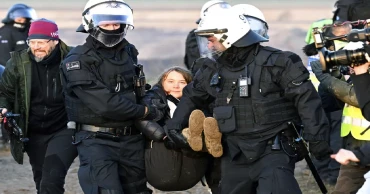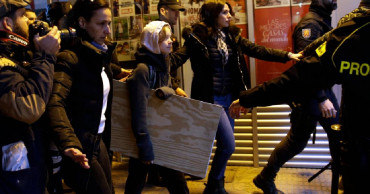Greta Thunberg
Greta Thunberg carried away by police at German mine protest
Police in western Germany carried Swedish climate activist Greta Thunberg and other protesters away Tuesday from the edge of an open coal pit mine where they demonstrated against the ongoing destruction of a village to make way for the mine's expansion, German news agency dpa reported.
Thunberg was among hundreds of people who resumed anti-mining protests at multiple locations in the western German state of North Rhine-Westphalia a day after the last two climate activists holed up in a tunnel beneath the village of Luetzerath left the site.
The German government reached a deal with energy company RWE last year allowing it to destroy the village in return for ending coal use by 2030, rather than 2038. Both argue the coal is needed to ensure Germany’s energy security that's squeezed by the cut in supply of Russian gas due to the war in Ukraine.
But environmentalists say bulldozing Luetzerath will result in vast greenhouse gas emissions. Germany is expected to miss its ambitious climate targets for the second year in a row.
Amid the heated coal debate in Germany, the European Union pushed forward on Tuesday with a major clean tech industrial project designed to boost its plans for a greener future as the 27-nation bloc pursues the goal of being climate neutral by 2050.
Elsewhere in western Germany, dozens of climate activists glued themselves to a main street in Germany’s western city of Cologne and to a state government building in Duesseldorf. Near Rommerskirchen, a group of about 120 activists also occupied the coal railroad tracks to the Neurath power plant, according to police and RWE.
Those who refused to leave the tracks were carried away, dpa reported.
Read more: Teenage climate activist nominated for Nobel Peace Prize
In addition, several people occupied a giant digger at the coal mine of Inden, while hundreds of other protesters joined a march near Luetzerath. The village itself was evacuated by the police in recent days and is sealed off.
Once again, there were a few clashes with the police.
Several activists ran over to the Garzweiler open pit mine, according to dpa. They stood at the brink of the open pit, which has a sharp break-off edge. Police said it was dangerous and people were prohibited from staying there.
Thunberg had traveled to western Germany to participate in weekend demonstrations against the expanded mine and also took part in Tuesday’s protest near Luetzerath. Police in nearby Aachen said a group of around 50 protesters got dangerously close to the rim of the mine and did not want to leave despite being asked to do so.
All the people in that group had to be carried away from the edge of the mine and were then temporarily held to determine their identities, police said. Photos from the scene showed Thunberg was one of those whom officers took away.
One protester was able to enter the mine, RWE said, calling the move “very reckless,” dpa said.
A police spokesman, who spoke on condition of anonymity as is customary in Germany, said he was not permitted to give out any details on Thunberg or any other individuals who participated in the protest due to privacy rules.
Police and RWE started evicting protesters from Luetzerath on Jan. 11, removing roadblocks, chopping down treehouses and bulldozing buildings.
Activists have cited the symbolic importance of Luetzerath for years, and thousands of people demonstrated Saturday against the razing of the village by RWE for the expansion of the Garzweiler coal mine.
3 years ago
PM calls for unity in war against nature
Prime Minister Sheikh Hasina called upon all to remain united in the war against nature to avert a possible loss for mankind.
“In our war against nature, we’ll lose unless we unite,” she wrote in the renowned magazine Diplomat in its April 2021 issue.
In the write up – ‘Forging Dhaka-Glasgow CVF-COP26 Solidarity’ – she said that humans are consciously destroying the very support systems that are keeping us alive.
“What planet shall we leave for the Greta Thunbergs or those at the Bangladesh Coastal Youth Action Hubs? At COP26 we must not fail them,” she said.
Sheikh Hasina, currently the president of the Climate Vulnerable Forum (CVF), said, we want to see climate financing unleashed, not only towards low-carbon economy, but also for the promised US$100 billion, and 50 percent dedicated to climate resilience-building.
Also read: Leaders Summit on Climate: Kerry due Apr 9 to invite PM Hasina
“We want to see international carbon markets unlocked for transnational climate cooperation and solutions found to our profound loss, damage and climate injustice,” she added.
She mentioned that the CVF represents over one billion of the world’s most vulnerable communities, whose very survival is threatened by the slightest sea level rise, frequent hurricanes or rapid desertification.
In this connection, she said that for Bangladesh, often referred to as the ‘ground zero’ of natural disasters, climate change is a survival battle braved by millions of our resilient people whose homes, lands and crops are lost to the recurring wrath of nature.
Every year, 2% of country’s GDP is lost to extreme climate events. By the turn of the century, it will be 9%. By 2050, more than 17% of its coastlines will go underwater displacing 30 million.
Six million Bangladeshis have already become climate displaced. And yet the country continues to bear the 1.1 million Rohingyas from Myanmar at the cost of environmental havoc in Cox’s Bazar.
“Who will pay for this loss and damage?” She asked.
Also read: Climate adaptation: Bangladesh for making finance more accessible
The Prime Minister wrote that like Bangladesh, every CVF nation has an irreversible climate loss and damage story to tell.
“But they contributed little to global emissions. It is time to address this climate injustice.”
She said that international cooperation on climate had been de-prioritised by the US for several years. International climate finance was falling far short of the $100 billion pledged at Paris.
“The G-20, accounting for nearly 80 per cent of global emissions lacked the political will to finance transactional carbon markets to support low-carbon projects in vulnerable countries. Loss and damage remained a far cry.”
And then, she said, COVID-19 hit us like a bolt from the blue, triggering the triple perils of climate, health and nature. A rude awakening finally forced the world to heed to my warning that the climate crisis is indeed an emergency.
And any recovery had to be green, nature-based and resilient. Therefore, my first act as CVF President was to declare climate change a ‘planetary emergency’ and call upon all to be on a ‘war footing’ to arrest global temperature rise at 1.5 degrees.
Also read: Bangladesh with Maldives in fighting climate change: PM
“By Autumn 2020, I’d seen very few NDCs (Nationally Determined Contributions), and COP26 was postponed, so I launched the ‘Midnight Survival Deadline for the Climate’ initiative at the CVF Leaders’ Summit,” Sheikh Hasina said.
She said that US President Joe Biden’s returning to the Paris treaty was also inspiring.
“But those who failed to meet CVF’s midnight-deadline, I urge them, to submit ambitious NDCs ahead of COP26. CVF’s most vulnerable members pledged no less than a net-zero by 2030, including Barbados, Costa Rica and the Maldives.”
Talking about Bangladesh, she wrote that Bangladesh, the CVF member with the largest population, also submitted interim NDC updates with additional pledges over and above Paris to reduce methane emissions. For Bangladesh and the CVF, climate adaptation and financing is a prime ‘survival’ priority as we relentlessly struggle to protect our populations from recurrent extreme climate events.
“Realistically, my climate survival philosophy has been a common sense one. ‘Help thy self’ and wait for no one to rescue. Because, climate change is not going to spare us for our inactions.”
As a testament to this, she said, she had long championed locally-led adaptation and resilience-building at the heart of which are local actors, especially women and youth.
In 2020, when Category-5 Cyclone Amphan mercilessly hit Bangladesh and India, Bangladesh demonstrated its capability to evacuate 2.4 million people and half-a-million livestock to safety in less than five days.
Also read: Climate change: Hasina seeks more actions than words
That same year, two-thirds of Bangladesh went under water in flash floods during the pandemic.
Even though this double jeopardy cost $3.5 billion in GDP losses, disaster preparedness of Bangladesh saved millions of lives.
She said that Bangladesh has also learnt to self-finance its climate projects. The government has thus created a $450 million Bangladesh Climate Change Trust Fund that supports nearly 800 adaptation and resilience projects in its vulnerable coasts.
“We are spending on an average 2.5 per cent of our GDP – US$5billion each year – on climate adaptation and resilience-building.”
She said that Bangladesh built 16.4km of sea dykes, 12,000 cyclone shelters and 200,000 hectares of coastal plantation.
The scientists invented nature-based solutions for the country’s coastal communities, such as salinity and stress tolerant crops, rain reservoirs and pond-sand-filters, floating agriculture technology and mobile water treatment plants.
In Bangladesh, the Prime Minister wrote, we are now championing climate prosperity. By pioneering the ‘Mujib Climate Prosperity Decade 2030,’ named after Bangladesh’s Founding Father, Bangabandhu Sheikh Mujibur Rahman during his birth centenary, I have called CVF nations to initiate ‘climate prosperity plans.’ We have already planted 11.5 million trees under our plan.
These are strategic, low carbon investment frameworks integrated into national development plans for capturing our growth and prosperity. But the CVF can only do so much on its own.
“There is a limit to adaptation too!” she said.
“It is vital to build strong CVF-COP solidarity. We want to see a Dhaka-Glasgow-CVF-COP26 Declaration emerge from November’s meeting. We, the climate vulnerable nations want to see G20 submit ambitious NDCs before COP26.”
4 years ago
Indian police file criminal case, post-celebrity tweets on farmer protests
Police in India Thursday filed a criminal case against what it claimed "an overseas conspiracy" to defame the country in the wake of recent tweets by global celebrities like pop star Rihanna and teen climate activist Greta Thunberg in support of the protests around the national capital by farmers against three controversial farm laws.
5 years ago
1 tweet from Rihanna on farmer protests gets India incensed
It took just one tweet from Rihanna to anger the Indian government and supporters of Prime Minister Narendra Modi’s party. The pop star linked a news article in a tweet drawing attention to the massive farmer protests that have gripped India for more than two months.
5 years ago
Greta Thunberg reaches Madrid for climate activists' march
Climate activist Greta Thunberg arrived in Madrid Friday to join thousands of other young people in a march to demand world leaders take real action against climate change.
6 years ago
Mural of activist Greta Thunberg going up in San Francisco
Teen climate activist Greta Thunberg is staring down at pedestrians in the heart of San Francisco where an artist is painting a massive mural of the Nobel Peace Prize nominee.
6 years ago
Swedish activist declines prize: climate doesn't need awards
Teen activist Greta Thunberg, who has inspired millions across the world to stage protests urging leaders to tackle global warming, has declined an environmental prize, saying "the climate movement does not need any more prizes."
6 years ago

.jpg)
.jpg)
.jpg)






